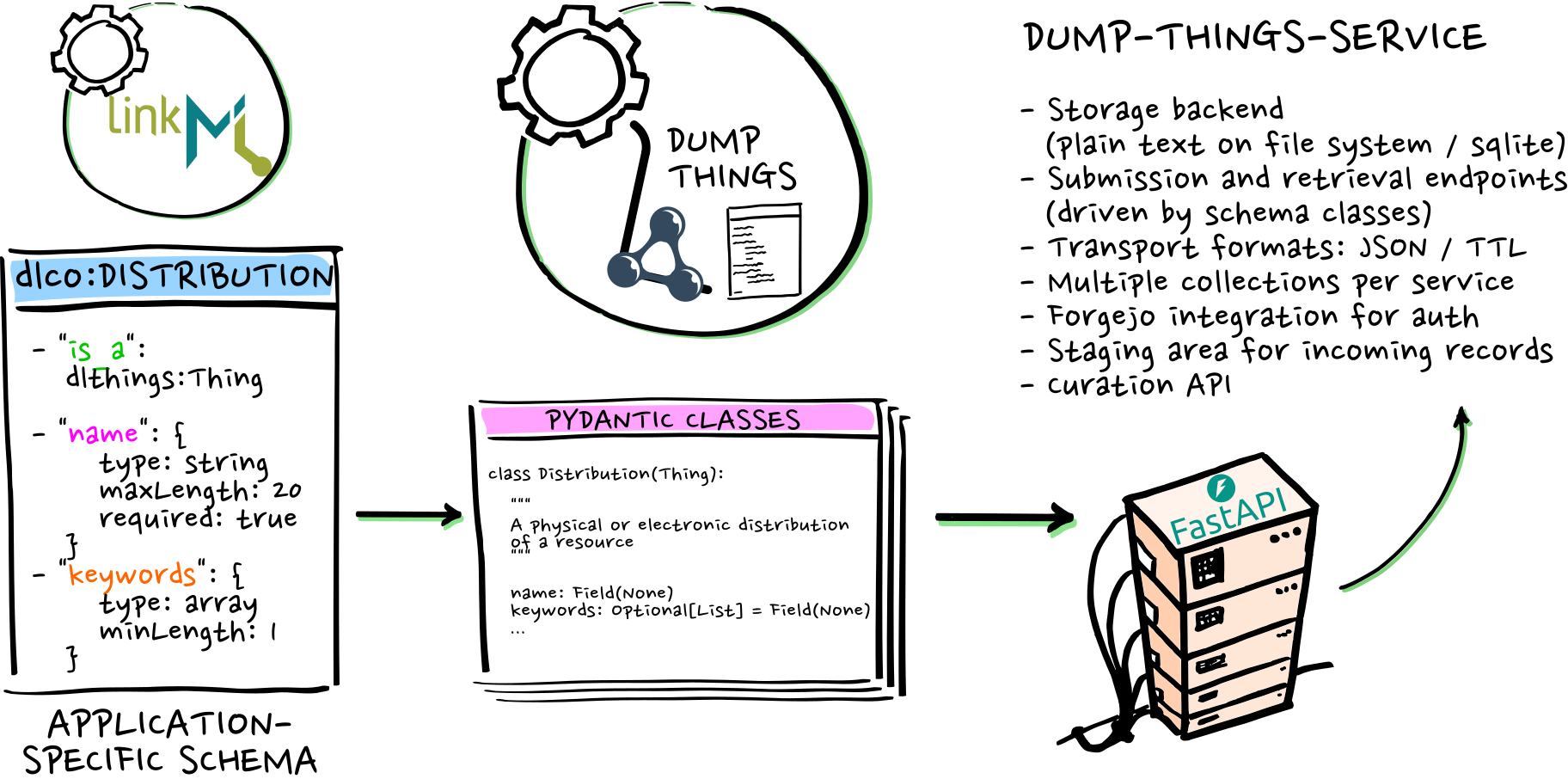Backend integration with dumpthings
While shacl-vue supports loading data from a static TTL source, it becomes much more powerful when integrated with a backend that allows HTTP-based storage and retrieval of information. The dump-things-server tool (or dumpthings for short), is such a backend. It has been co-developed with shacl-vue from the start, and is straightforward to integrate. The figure depicts how the service is schema-driven (just like shacl-vue), which enables autogenerating API endpoints per identifiable class.

Further useful features of dumpthings (such as collection management, authorization, curation endpoints, and more) can be found at the source code documentation.
In order to integrate dumpthings with shacl-vue, a deployment has to run first. See how the install, deploy, and configure the service here.
On the shacl-vue side, all the necessary integration steps can be done via configuration. These are explained in the Application configuration section. The options relevant to service integration are provided here as well.
use_service
Set this to true to activate service integration with a dumthings backend.
service_base_url
This tells shacl-vue where to make requests to. Multiple base URLs are supported, in support of dumpthings's ability to make data available via multiple collections, all supporting the same endpoints. A real-world use case is access control: users might be allowed by default to read from a collection of data, but might need permission to write data to a different subset. This also shows another requirement when specifying the base URL: the read/write type (note: write also implies read).
An example:
"service_base_url": [
{
"url": "https://pool.v0.edu.datalad.org/api/protected/",
"type": "write"
},
{
"url": "https://pool.v0.edu.datalad.org/api/public/",
"type": "read"
}
]If multiple base URLs are specified, shacl-vue will query all of them (depending on the type).
service_constrained_search
dumpthings supports a matching query parameter to allow constrained searches of data in the backend. This is integrated with shacl-vue's type-to-search functionality. The min_characters (default: 4) sets the minimum amount of characters that a user has to type before a constrained query is made to the backend.
service_endpoints
This option provides templates for constructing full query URLs to specific endpoints. These endpoints are linked very specifically to steps in the application UX, for example:
- When a user selects a class (a.k.a. data type) from the main view:
get-paginated-records - When a user scrolls to the bottom of a list of records:
get-paginated-records(with the next page as parameter) - When the viewer for a specific record is rendered:
get-record - When a user types-to-search in the main view or in the
InstancesSelectEditorcomponent:get-paginated-records-constrained - When the application should fetch records upfront:
get-records-before(see below) - When a record is submitted:
post-record
The standard set of endpoint templates are:
"service_endpoints": {
"post-record": "record/{name}?format=ttl",
"get-record": "record?pid={curie}&format=ttl",
"get-records": "records/{name}?format=ttl",
"get-records-before": "records/{name}?format=ttl",
"get-paginated-records": "records/p/{name}?format=ttl&size=100&page={page_number}",
"get-paginated-records-constrained": "records/p/{name}?format=ttl&matching=%25{match_string}%25&size=100&page={page_number}"
}Note: name and curie define in which format the record IRI is to be filled into the template.
These endpoint templates are tuned to work with dumpthings specifically, and would have to change for integration with a different service (i.e. differently structured API endpoints).
service_fetch_before
shacl-vue aims to minimize network load and delay (leading to user frustration) by only sending queries when it has to (as driven by the UX), not duplicating queries across a session, and using pagination and constrained queries. However, sometimes specific records or all records of a specific type are useful to have in the app upfront. This service_fetch_before option allows class IRIs or record IRIs to be provided, and these will be fetched and made available in the app on startup.